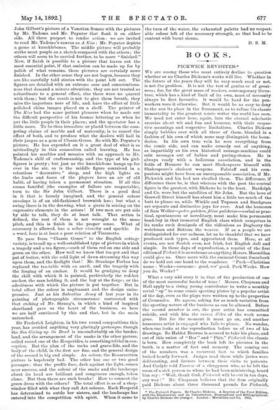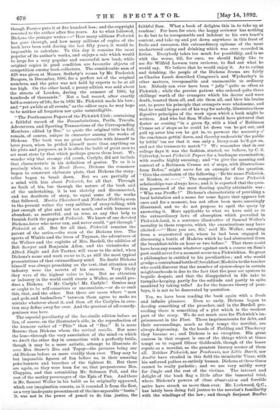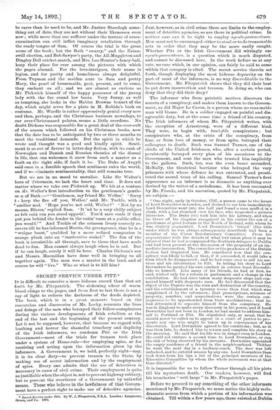BOOKS.
PICKWICK REVISITED.*
WE are among those who must entirely decline to question whether or no Charles Dickens's works will live. Whether in the future of the years they will be very much read or not, is not the problem. It is not the test of genius or of great- ness; for, for the great mass of readers, contemporary litera- ture, which has a kind of limit of its own, must of necessity always be first favourite. It would be hard for the pen- workers were it otherwise. But it would be as easy to deny to the sun its place in the firmament, as to refuse his classic immortality to the greatest comic writer the world has seen. We need not enter here, again, into the eternal scholastic exercise about wit and fun and humour, with their respec- tive meanings and respective limitations. Charles Dickens simply bubbles over with all three of them, blended in a fashion of his own of which none may distinguish the boun- daries. In his own true vein he sees everything from the comic side, and can make comedy out of anything, as impartially as his own historical sausage-machine could coin sausages out of babies and paving-stones. He is always ready with a ludicrous association, and in the fields of Humour he can meet Shakespeare himself with Shakespeare's choicest weapons. Falstaff and his com- panions might have been an unsurpassable association, if Mr. Pickwick and his had not rivalled them. The difference, if difference there be, is that whereas with the poet the central figure is the greatest, with Dickens he is the least. Bardolph and Co. were but the satellites of Sir John. But the hero of Goswell Street himself has about him a little too much of the butt to please us, while Winkle and Tupman and Snodgrass are separate and distinctive joys for ever. And the humours of Sam Weller—pairs pular°, filing pulchrior—verbal or prac- tical, spontaneous or hereditary, must make him permanent head-boy in that immortal English class which comprises in its ranks such demigods of the ridiculous as Dogberry the watchman and Bottom the weaver. If as a people we are distinguished for our sadness, let us be thankful that we have produced such types, and appreciated them. Here, at all
events, are not Scotch even, not Irish, but English dull and simple. In these days of reproduction, a reprint of the first edition of Pickwick is as welcome as anything Messrs. Macmillan could give us. Once more with the eminent Count Smorltork do we hold out one hand to the wanderer. "Peek—Christian name : Weeks—surname : good, ver' good. Peek Weeks. How you do, Weeks?"
What a very odd story it is, that of the production of one of the most successful books of time ! Messrs. Chapman and Hall apply to a rising young contributor to write a monthly serial " up " to some comic sporting plates by a popular artist of the day, even as the plays were written up to the properties of Crummles. He agrees, asking for as much variation from the sporting nature of the business as can be allowed. Before the second number is out, the poor artist has committed suicide, and with him the raison d'être of the work seems gone. But for the moment it must go on, and another humorous artist is engaged who fails to please. No wonder, when one looks at the reproduction before us of two of his drawings. So Ha.blot Browne is secured to take his place, and out of this union of " Boz " and " Phiz," Pickwick the classic is born. How completely the book left its pictures in the lurch, is a matter of fact and memory. The coming out of the numbers was a recurrent fact to which families looked hourly forward. Judges read them while juries were deliberating, and doctors between their visits to patients. And Carlyle told Forster of a clergyman who, as he left the room of a sick person to whom he bad been ministering, heard him say : " Well, thank God, Pickwick will be out in ten days, any way !" Mr. Chapman believes that the firm originally paid Dickens about three thousand pounds for Pickwick,
• The Pickwick Papers. By Charles Dickens. A Reprint of the First Edition, with the Illustrations and an Introduction, Biographical and Bibliographioal, by Charles Dickens the younger. London : Macmillan and Co. 1892.
though Forster puts it at five hundred less; and the copyright reverted to the author after five years. As to what followed, Dickens the younger writes :—" How many editions Pickwick has gone through, and how many millions of copies of the book have been sold during the last fifty years, it would be impossible to calculate. To this day it remains the most popular of its author's works, and enjoys a sale which would be large for a very popular and successful new book, while original copies in good condition are favourite objects of competition among book-collectors. The considerable sum of 228 was given at Messrs. Sotheby's rooms by Mr. Frederick Burgess, in December, 1886, for a perfect set of the original numbers, and the price was not held by experts to be at all too high. On the other hand, a penny edition was sold about the streets of London, during the summer of 1886, by hundreds of thousands." Not a bad record, after exactly half-a-century of life, for in 1836 Mr. Pickwick made his bow; and "yet awhile at all events," as the editor says, he may hope to be neither all forgotten nor quite unintelligible.
"The Posthumous Papers of the Pickwick Club : containing a faithful record of the Perambulations, Perils, Travels, Adventures, and Sporting Transactions of the Corresponding Members : edited by Boa," to quote the original title in full, remain, of course, unique in character among the works of Dickens. The book was no great favourite with himself in later years, when he prided himself more than anything on his plots and purposes, as it is often the habit of great men to set most store by that which perhaps graces them least. We wonder why that strange old crank, Carlyle, did not include that characteristic in his definition of genius. To us it is precisely when, as in Bleak House, Dickens the romancer began to construct elaborate plots, that Dickens the story- teller began to break down. But we are partially of a mind with him about Pickwick, for all that. Through no fault of his, but through the nature of the book and of the undertaking, it is too sketchy and disconnected, and too destitute of story, to equal some of the works that followed. Martin Chuzzlewit and Nicholas Nickleby seem to the present writer the very sublime of story-telling, with just enough of plot and not too much, and with humour as abundant, as masterful, and as true, as any that help to furnish forth the pages of Pickwick. We know of one devoted Dickens-lover who never can, and never could, "get through" Pickwick at all. But for all that, Pickwick remains the parent of the series,—the stem of the Dickens tree. The sports of Winkle and the loves of Tupman, the adventures of the Wellers and the exploits of Mrs. Bardell, the oddities of Bob Sawyer and Benjamin Allen, and the vicissitudes of Alfred Jingle and Job Trotter, will recur to the mind, when Dickens's name and work recur to it, as still the most typical presentations of that extraordinary mind. No doubt Dickens himself was always preaching on the text, that attention and industry were the secrets of his success. Very likely they were of the highest value to him. But no attention or industry in the world could create a Weller, or could pro- duce a Dickens. 0 Mr. Carlyle ! Mr. Carlyle! Genius may or ought to be self-conscious or unconscious,—or do or omit this, that, and the other. But there are cases where "men and gods and booksellers" between them agree to make no mistake whatever about it, and then all the Carlyles in crea- tion may define away for ever. And the greatest of all comedy geniuses was here.
The especial peculiarity of the fac-simile edition before us lies, of course, on the illustrator's side, in the reproduction of the humour rather of " Phiz " than of "Boa." It is more Browne than Dickens whom the revival recalls. But none the less—through the very association of the mind en which we dwelt the other day in connection with a perfectly futile, though it may be a more artistic, attempt to illustrate de novo Mrs. Stowe's Eva and Topsy—the pictures bring our old Dickens before us more vividly than ever. They may be but impossible figures of fun before us, in their amazing poke-bonnets and breeches of the tightest fit. But there are again, as they were born for us, that preposterous Mrs. Cluppins, and that astonishing Mr. Solomon Pell, and the rest of the motley personages of the Epic of Fun. And there is Mr. Samuel Weller in his habit as he originally appeared,
which our imagination resents, as it resented it from the first, as a very inadequate presentment of the incomparable " boots." It was not in the power of pencil to do him justice, the faithful Sam. What a book of delights this is, to take up at random! For here, for once, the happy reviewer has nothing
to do but to be irresponsible and indolent to his own heart's content, and take up and put down anywhere in this feast of frolic and unreason, this extraordinary epitome of the most unchartered eating and drinking which was ever recorded in fiction. Everybody takes too much for possibility, and is no whit the worse, till, for once, we should fairly like to see Sir Wilfrid Lawson turn reviewer, to find out what he would say. We believe that he would enjoy it. As to eating and drinking, the people of the Dickens drama are fairly
as Charles Lamb described Congreve's and Wycherley's in other matters, irresponsible and unamenable to ordinary law. Nobody can ever have been " jolly " quite so often as Pickwick ; while the precise patient who ordered quite three shillings' worth of the crumpets which his doctor said were death, toasted them all, and ate them all, and blew his brains out, to prove his principle that crumpets were wholesome, and that he would be put out of his way for nobody, illustrates those digestive principles of the work upon which a book might be written. And who but Sam Weller would have pictured that doctor as coming "in a green fly, with a kind o' Robinson Crusoe set o' steps as he could let down yen he got out, and pull up arter him ven he got in, to perwent the necessity o' the coachman gettin' down, and thereby undeceivin' the public by lettin"em see that it wos only a livery-coat he'd got on, and not the trousers to match " ? We remember that in our college days it was the fashion, started, we believe, by C. S. Calverley, to set Pickwick Papers for a burlesque examination, with results highly amusing; and "to give the meaning and context of a Robinson Crusoe set o' steps, with illustrations from Defoe," might serve for an example of the question. "Give the conclusion of the following : Be his name Pickwick, or Noakes, or —." The competition for these Pickwick scholarships was always keen ; and it is reported that the ques- tion possessed of the most flooring quality attainable was : "Who was Praffle ?" Dickens's characteristic of providing a local habitation and a.name for some figure that appears but once and for a moment, has not often been more amusingly illustrated, and we do not propose to spoil the query by answering it. More applicable to what we have said as to the extraordinary laws of absorption which prevailed in Pickwick-land, is a sentence illustrative of Samuel Weller's morality in these respects, which the examinations may have elicited :—" Here you are, Sir,' said Mr. Weller, emerging from a sequestered spot, where he had been engaged in discussing a bottle of Madeira which he had abstracted from the breakfast-table an hour or two before." That there could have been any reason whatever against such a course on Sam's part could never for a moment occur to a Pickwickian. So great a philosopher is entitled to his peculiarities ; and who would grudge a contraband bottle of (breakfast) Madeira to the teacher who could discover that the number of oyster-shops in certain neighbourhoods is due to the fact that the poor eat oysters to beguile despair, and that the disappointed in life take to turnpike-keeping, partly for the solitude and partly to spite mankind by taking tolls ? As for the famous theory of post- boys, it is not to be desecrated by quotation.
Yes, we have been reading the book again with a fresh and infinite pleasure. Even so early, Dickens began to develop something of the preacher, and in the Bardell pro- ceeding there is something of a plot which is the weakest part of the story. We do not much care for Pickwick's im- prisonment in the Fleet. These imprisonments for debt, and their surroundings, much as they tempt the novelist, are always depressing. In the bands of Fielding and Thackeray they became so ; and Dickens is no exception. His great success in that respect is one of the things which at times tempt us to regard Oliver Goldsmith, though of the lesser repute as a novelist, as the greatest literary master of them all. Neither .Pickwick, nor Pendennis, nor Little Dorrit, nor Amelia have rivalled in this field the inimitable Vicar, with his unforced pathos so entirely human. Dickens at these times cannot be really pathetic ; and we are very mildly sorry for Jingle and the rest of the victims. The interest and delight of the book flag a little after the immortal trial, where Dickens's powers of close observation and forcible satire have struck us more than ever. Mr. Lockwood, Q.C., has lately been doing full justice to the novelist's familiarity with the windings of the law ; and though Serjeant Buzfuz
be rarer than he used to be, and Mr. Justice Starelegh some- thing out of date, they are not without their likenesses even now ; while more than one sufferer under the torture of cross- examination can still inflict imaginary retaliation through the ready tongue of Sam. Of course the trial is the great scene of the book; but the Bath " swarry," and the Eatan- swill election, and Bob Sawyer's party, the All-Maggleton and Dingley Dell cricket-match, and Mrs. Leo Hunter's fancy-ball, keep their place for ever among the pictures with which the pages abound. For the love-intrigues, their name is legion, and for parity and homeliness always delightful. From Tupman and the maiden aunt to Sam and pretty Mary, the pearl of housemaids, past, present, and to come, they enchant us all ; and we are almost as envious as Mr. Pickwick himself of the happy possessor of the young lady with the fur round her boots. Very funny, as well as tempting, she looks in the Hablot Browne bonnet of the day, which might serve for a plate in M. Robida's book on • costume. Mr. Wardle is rather oppressively genial every now and then, perhaps, and the Christmas business nowadays, to our over-Christmased palates, seems a little overdone. No doubt Dickens was responsible for a great deal of the over-cult of the season which followed on his Christmas books, now that the date has to be anticipated by two or three months to meet the traditional demands. But the spirit in which he wrote and thought was a good and kindly spirit. Senti- ment is so out of favour in latter-day fiction, with its rush of Norwegian and Danish and Russian theories of the dismal in life, that one welcomes it anew from such a master as a fault on the right side, if fault it be. The Duke of Argyll said once in a forcible speech that sentiment rules the world, and if we eliminate sentimentality, that still remains true.
But we are in no mood to moralise. Like Sir Walter's hero of Triermain, we lack the heart and time. It does not matter where we take our Pickwick up. We hit at a venture on air. Weller's first introduction to the gentlemen's gentle- :n of Bath :—" Gentlemen, my friend Mr. Weller." Sorry keep the fire off you, Weller,' said Mr. Tuckle, with a familiar nod. 'Hope you're not cold, Weller?" Not by no means, Blazes,' replied Sam. It 'ud be a very chilly subject as felt cold ven you stood opposit'. You'd save coals if they put you behind the fender in the vatin' room at a public office, you would.' " And Tackle of the crimson livery scarcely re- covers till he has informed Harris, the greengrocer, that he is a. " wulgar beast," qualified by a more refined companion in orange plush into an "inattentive reskel." The fun of the book is irresistible all through, save to those that have souls dead to fun. Man cannot always laugh when he is sad. But if be can laugh, surely it will be here. Charles Dickens's son and Messrs. Macmillan have done well in bringing us all together again. The man was a master in the land, and of course he will "live." Who or what is to kill him?








































 Previous page
Previous page